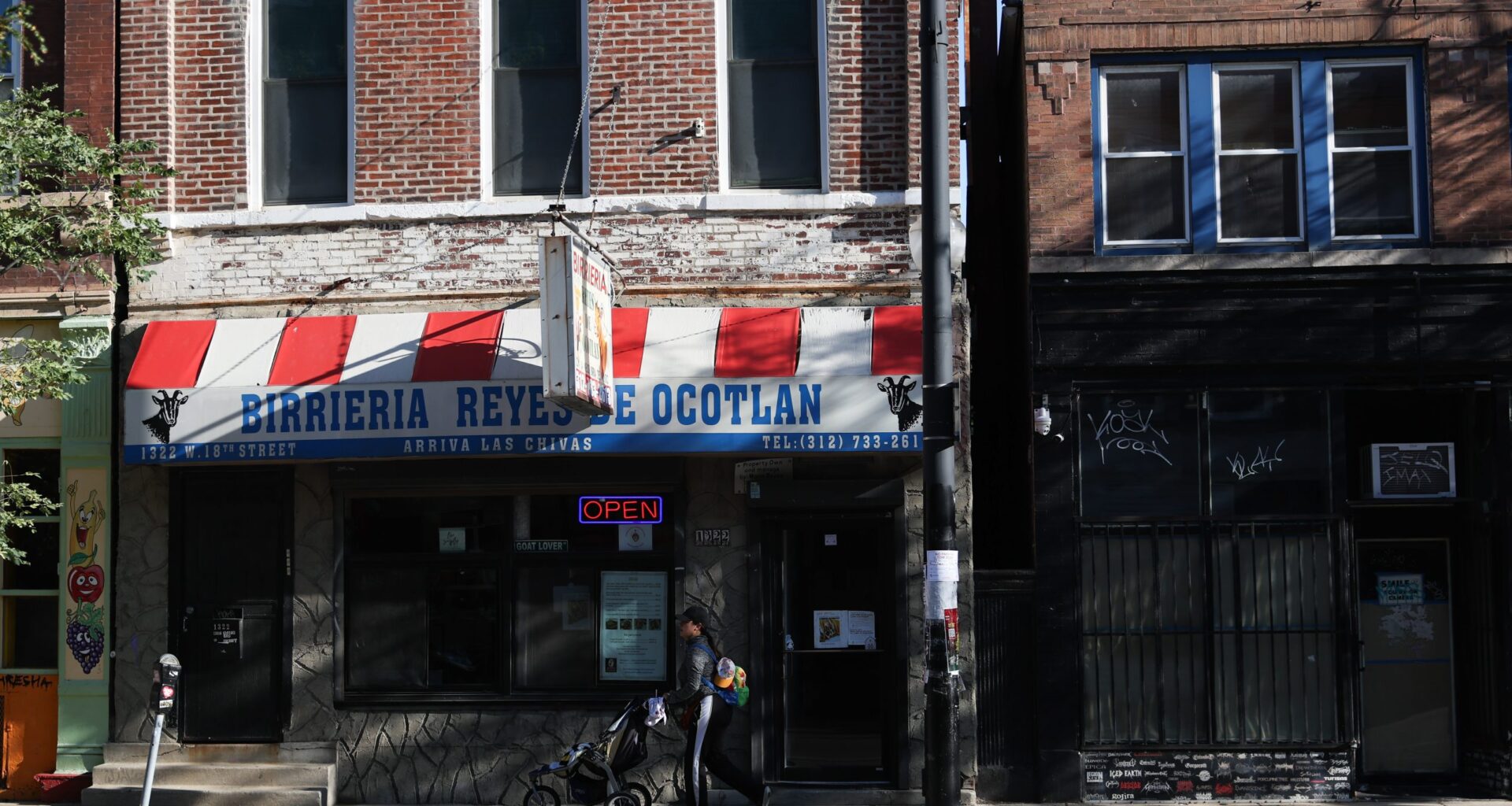CHICAGO — Early Saturday morning, Dave Miller of Lincoln Square’s Bagel Miller got a text from one of his employees saying she didn’t feel safe coming into work.
Living in the Logan Square and Humboldt Park area — where federal agents have smoke bombed and tear-gassed people on the streets — she was afraid to leave her house, she said.
After hearing from other employees expressing similar feelings, Miller, who was out of town at the time, told them to stay home. While the neighborhood’s popular Apple Fest was in full force, the restaurant at 4655 N. Lincoln Ave. locked its doors and accepted only online orders to be picked up at its to-go window. Employees would still be paid, Miller assured them. The business has since reopened fully.
“We can’t ask anyone to risk their safety just to serve bagels — especially when they’re already showing up every day trying to do things right,” Miller wrote in an Instagram post that day.
The post ended with, “And yeah — f— racism.”
“We hire people who are legally allowed to work and are following the rules, but they were worried about going to work and being targeted because they are Brown,” Miller said Monday in an interview with Block Club. “We decided we needed to give them space, and the only way we could stay functioning as a small business was to shut down the inside.”
As immigration enforcement has escalated across the city with federal agents staging raids and arresting people, often aggressively, in public view, so too have the fears of restaurant workers and owners across the city. An industry reliant on immigrants is quietly struggling with staff shortages and morale, and restaurant operators are grappling with how to ensure the safety and security of their employees while keeping their businesses running and customers happy.
“I’m noticing people are short on dishwashers,” Miller said. “They’re not saying why, but we all know why. There are a lot of people who don’t feel free to speak up.”
Backbone Of The Industry
Twenty-two percent of restaurant workers in the United States are immigrants, according to the National Restaurant Association. That number is even higher — 40 percent — among foodservice employees in Illinois, Sam Toia, president and CEO of the Illinois Restaurant Association, said last month in a WBEZ interview.
From the host stand to the hot line, immigrants play an outsized role in restaurants across the city and suburbs. Now, with operations Midway Blitz and At Large in full effect, fear and disruption have become the dominant themes not only in kitchens but also in dining rooms.
The increased presence of federal agents — including droves of armed Border Patrol agents who marched last month Downtown and along busy streets in the Gold Coast — and this week’s deployment of the National Guard is “disrupting restaurant operations significantly, resulting in staffing shortages among other concerns,” Toia said in an emailed statement.
“Based on current information and previous experiences in Los Angeles and Washington, D.C., the deployments create fear among Chicago diners, resulting in decreased reservations, foot traffic and lower revenue for struggling restaurants,” Toia said. “Consumer confidence is critical, and the additional presence reduces business levels at a crucial time when restaurants need more guests and more local and national support.”
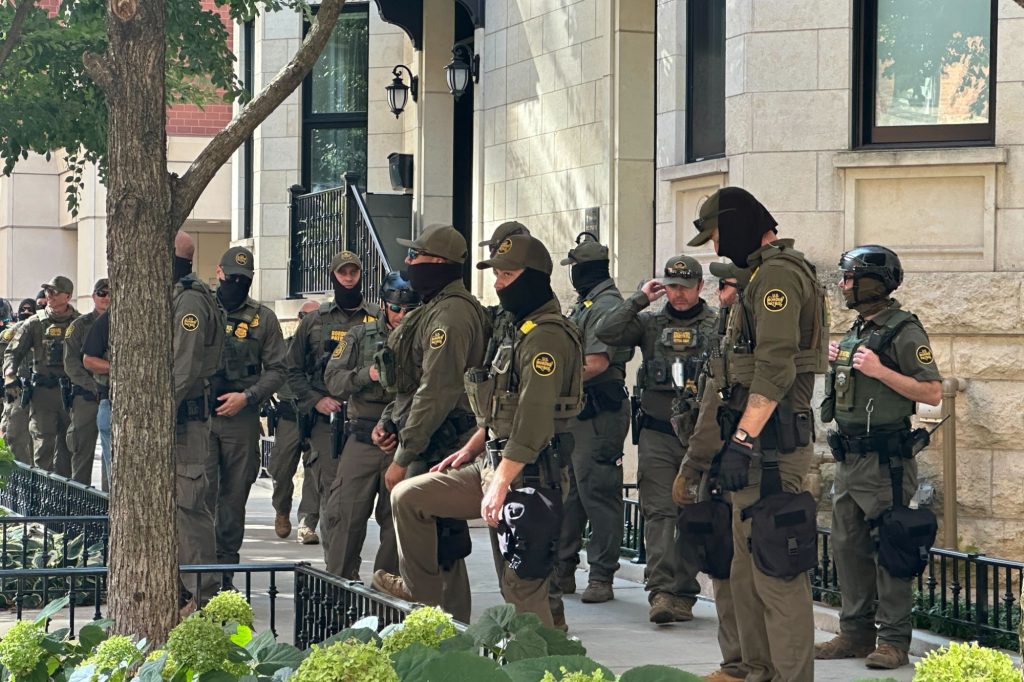 U.S. Border Patrol Agents are staged in Gold Coast Sunday, Sept. 28, 2025. Credit: Provided
U.S. Border Patrol Agents are staged in Gold Coast Sunday, Sept. 28, 2025. Credit: Provided
Many restaurant owners spoke with Block Club only on the condition of anonymity as they didn’t want their restaurants or staff to possibly become a target of immigration officers.
One chef and owner talked about the difficulties of grasping what the industry is going through.
“It’s hard to overemphasize how rough it is right now for restaurant employees,” he said. “They were considered front-line workers in the pandemic and still are front-facing people who are members of the community who are at risk.”
At his restaurant, a response plan is in place in the event ICE should show up, though he’s aware it only goes so far.
“It doesn’t seem like there’s much stopping [immigration agents] once they decide to go somewhere, besides going elsewhere,” he said.
Serving Customers, And Staying Alert
“Everyone knows someone who has been affected by this, whether its teachers seeing ICE outside of their daycare or hearing students say, ‘I don’t know if I will see you again,’” said Ed Marszewski, founder of Marz Community Brewery and a partner in Kimski restaurant, both in Bridgeport.
Marszewski heard of one restaurant recently targeted by ICE where the agents hung outside for hours, forcing some employees to remain inside until the agents left.
“I’ve heard a lot of stories like that,” he said.
Marszewski said he’s also seeing more “Know Your Rights” flyers and signs barring access to ICE agents who don’t have a signed warrant posted in the windows of restaurants and businesses in Bridgeport, Pilsen and farther south.
At the same time, unverified social media posts have circulated about Chicago restaurants and hotels refusing service to ICE agents.
To stay informed, some restaurants have organized private group text chats to keep each other aware of any raids or other ICE-related actions in their neighborhoods.
“Everyone is doing this,” said one chef who asked not to be named.
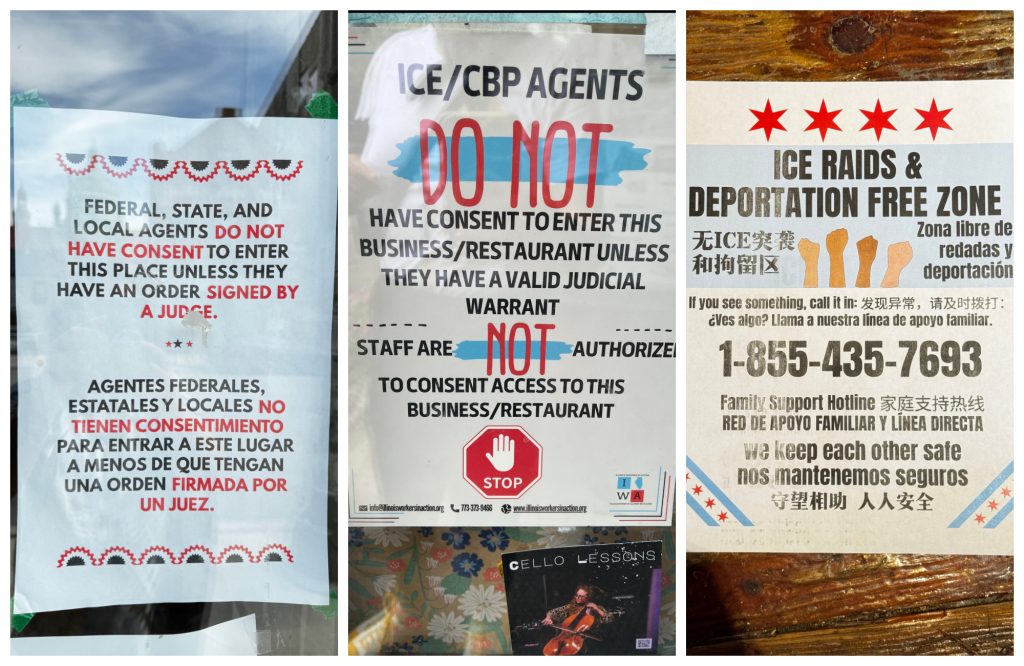 Signs spotted in the windows of restaurants and independent businesses in Pilsen and Bridgeport, declaring ICE-free zones. Credit: Provided/Ed Marszewski
Signs spotted in the windows of restaurants and independent businesses in Pilsen and Bridgeport, declaring ICE-free zones. Credit: Provided/Ed Marszewski
Another anonymous chef said he’s also part of citywide WhatsApp groups, and he’s in regular communication with his alderman’s office and other businesses to share information.
“It’s important for businesses to feel a sense of community at a time when it’s so disrupted,” he said. “This is meant to break spirits and instill fear so the response to that is opposing forces of care and concern. Doing that is very central to what hospitality businesses do.”
Marszewski has been advocating for progressive causes and social justice his entire life, he said.
“That’s just being human,” he said.
In the current climate, making sure employees know their rights and have educational materials are two ways to help, Marszewski said. To that end, Marz Brewery plans to host an ACLU workshop Oct. 29. The Bridgeport brewery is also taking part in Hasta La Raíz, a nationwide beer and beverage collaboration to raise awareness and funds for immigrant justice. Marz’s beer contribution is a maíz lager to be released Saturday to coincide with the brewery’s 11th anniversary party. A portion of the beer’s proceeds will be donated to Freedom for Immigrants.
Participating in whistle-blowing actions to warn others about ICE is another way to make a difference, Marszewski said. He half jokes about sending pizzas to the attorney general’s office.
“We have to support elected officials who are continuing to protect our citizens,” he said.
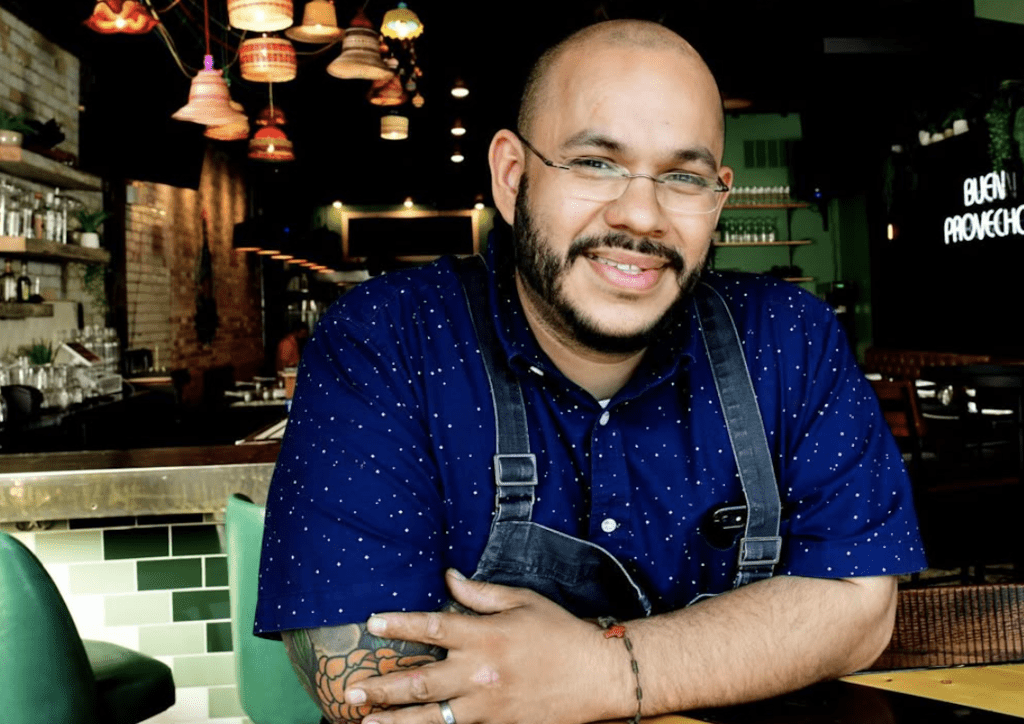 Chef Rodolfo Cuadros of Amaru, 1904 W. North Ave., said he’s prepared to shut down his restaurants in Wicker Park and Bucktown temporarily if ICE agents are in the vicinity. Credit: Instagram/Rodolfo Cuadros
Chef Rodolfo Cuadros of Amaru, 1904 W. North Ave., said he’s prepared to shut down his restaurants in Wicker Park and Bucktown temporarily if ICE agents are in the vicinity. Credit: Instagram/Rodolfo Cuadros
‘All About Making Our Employees Feel Safe’
Chef Rodolfo Cuadros, of Amaru in Bucktown, was born in New York and spent most of his childhood in Colombia.
“The thing that makes me the angriest is that I grew up in a time with the notion of America as a melting pot and what you strived for and were proud of,” Cuadros said. “It just seems like the current powers-that-be want a monolithic society of one color and one language. It’s hard now living in a country that doesn’t seem to want me.”
Cuadros, who also owns Lil Amaru in Timeout Market and Bloom Plant-Based Kitchen in Wicker Park, has decided that if ICE agents are spotted walking around the neighborhoods of his restaurants, he will shut down his restaurants until they leave.
“We have a commitment to do everything we can to keep employees safe while we are running a business,” he said.
“We all hope we can get back to people working safe and freely and with freedom of expression.”
Cuadros added that it’s telling he had to think hard about whether to include his name in this story.
Like Marszewski, chef and owner Jason Vincent of Giant and Pizza Matta in Logan Square and Chef’s Special Cocktail Bar in Bucktown is no stranger to expressing his political views publicly. He posts many an anti-Trump story and video on social media, loss of customers be damned — though even he was initially hesitant about being identified for this story.
“Our First Amendment right to peaceful protest and our right to be protected from unlawful search and seizure are being trampled on by the f—ing government,” he said.
Vincent hopes others in the industry will speak out in any way they can while still protecting their employees.
“To me, it’s so infuriating and irresponsible and unpatriotic that people think that this is politics just because politicians are pulling the strings,” he said. “That doesn’t make it politics. That makes it your life.”
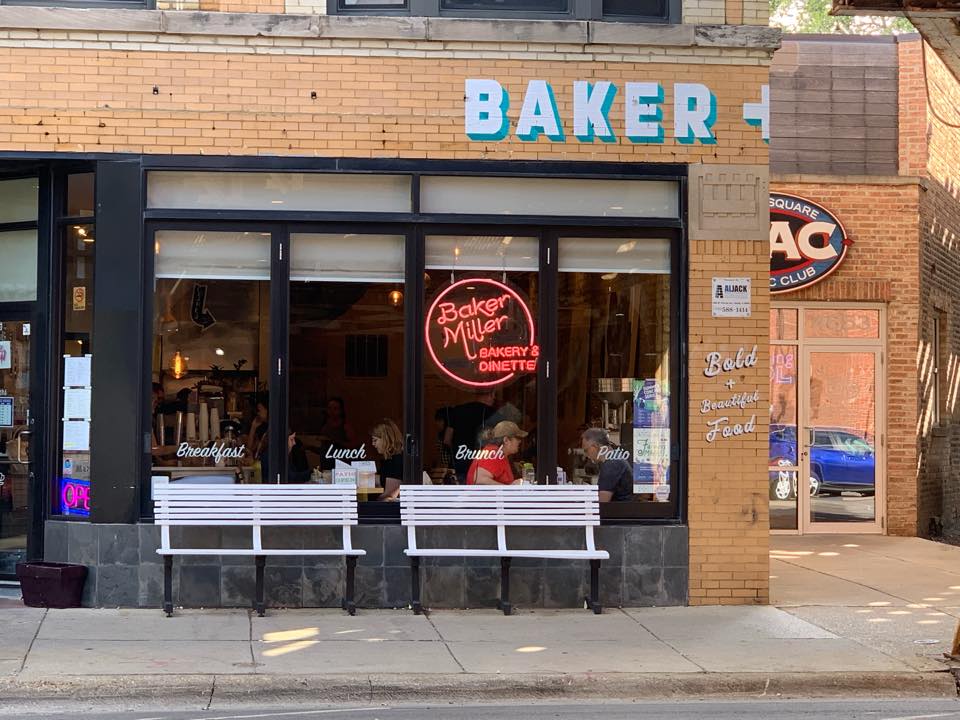 Bagel Miller, 4655 N. Lincoln Ave., closed for a day and took only online orders to protect its staff who were worried about ICE raids. Credit: Facebook/Bagel Miller
Bagel Miller, 4655 N. Lincoln Ave., closed for a day and took only online orders to protect its staff who were worried about ICE raids. Credit: Facebook/Bagel Miller
On Monday, Miller sat down with his staff at Bagel Miller to talk and help them filter through the current issues. He also met with attorneys who are keeping his employees informed of their rights, he said.
“They don’t have money for lawyers, but that’s what we can do,” Miller said. “Saying it will be OK and come to work isn’t a resolution. For me it will be, but for them it won’t. They are living in fear right now, which I feel is the point of this administration — to make it look like they are bigger and more powerful. It’s all about making our employees feel safe.”
Though Miller expected sales to take a hit at Baker Miller when the shop closed Saturday, they didn’t. The dining room has since reopened.
His Instagram post “went a bit viral, and people from all over the world placed orders and told us to donate them. So business was down but sales were the same as usual,” he said.
Baker Miller used the money from the donated orders for its meals program serving people in need, he said.
Listen to the Block Club Chicago podcast:
